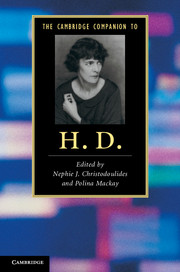Book contents
- Frontmatter
- Introduction
- PART I CONTEXTS AND ISSUES
- 1 ‘Uncanonically seated’: H.D. and literary canons
- 2 Facts and fictions
- 3 H.D. and the ‘little magazines’
- 4 H.D.'s modernism
- 5 H.D. and gender: queering the reading
- 6 Reading H.D.: influence and legacy
- PART II WORKS
- Further reading
- Index
- Cambridge Companions to…
1 - ‘Uncanonically seated’: H.D. and literary canons
from PART I - CONTEXTS AND ISSUES
Published online by Cambridge University Press: 28 November 2011
- Frontmatter
- Introduction
- PART I CONTEXTS AND ISSUES
- 1 ‘Uncanonically seated’: H.D. and literary canons
- 2 Facts and fictions
- 3 H.D. and the ‘little magazines’
- 4 H.D.'s modernism
- 5 H.D. and gender: queering the reading
- 6 Reading H.D.: influence and legacy
- PART II WORKS
- Further reading
- Index
- Cambridge Companions to…
Summary
In Tribute to Freud (1956), her memoir of work with the founder of psychoanalysis, H.D. at one point describes herself as ‘uncanonically seated’, placing herself outside the circle of those around Freud who, she suggests, were ‘richly intellectually and materially endowed’. As she often does in her work, here H.D. constructs her ‘uncanonical’ status as an important source of alternative knowledge and ability. Surprisingly, she even allies herself with Freud on this basis, going on to note that he himself is ‘uncanonical enough’. Her ‘enough’ here frames ‘uncanonicity’ as a quality one possesses to a greater or lesser extent (rather than as a lack of something) ‘enough’ of which can yield desirable effects. Here as elsewhere, H.D. places value on what lies outside the boundaries of that which is culturally sanctioned.
In her work more generally, however, in addition to featuring the position of the ‘outcast’, H.D. often also features compelling liminal zones, neither ‘here’ nor ‘there’, raising questions about the costs of inhabiting the stable locations assumed by discourse about canons, which decides between inside and outside. When addressing H.D.'s place in our literary canons, it is important to bear in mind what H.D.'s work often implies both about the benefits of ‘uncanonicity’, as well as of inhabiting in-between conditions that problematise both the legitimacy of the borderline between inside and outside, and the value of being definitely positioned as one or the other.
- Type
- Chapter
- Information
- The Cambridge Companion to H. D. , pp. 7 - 22Publisher: Cambridge University PressPrint publication year: 2011

